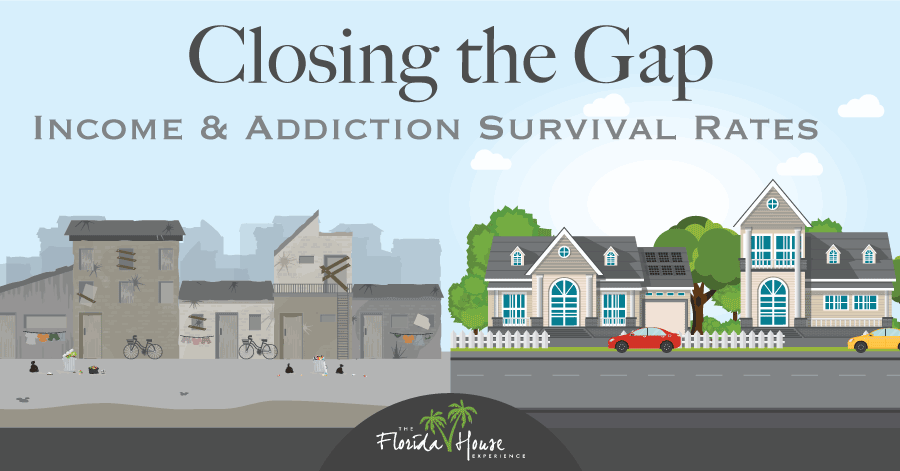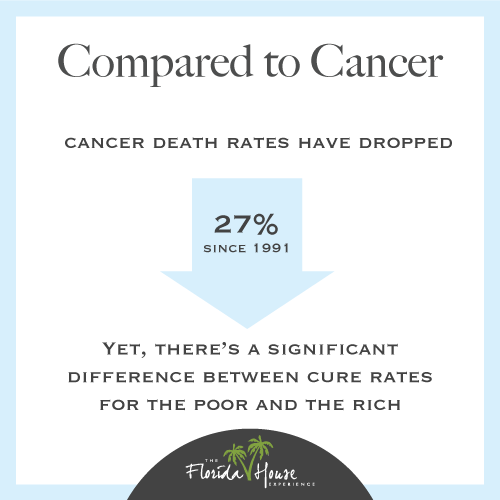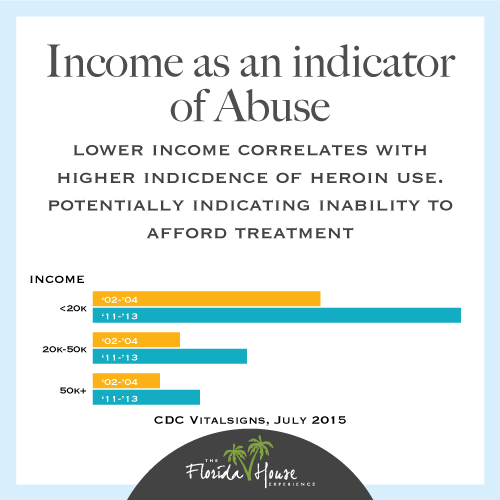
Most people would say that there’s no inequality when it comes to fighting addiction, and that everyone has equal access to treatment programs. Recent studies look at how treatment for any disease isn’t always the same for the poor or people without health insurance. That translates into higher stakes for those who have an addiction.
Cancer as an Example
 In a recent article published by Vox, author Julia Belluz sites how the treatment options and success rates against various types of cancer are on the rise. The good news is cancer death rates have dropped by 27 percent since 1991, according to a report from the American Cancer Society. That means that, in 2016, 2.6 million fewer people died from cancer than did in the 1990s.
In a recent article published by Vox, author Julia Belluz sites how the treatment options and success rates against various types of cancer are on the rise. The good news is cancer death rates have dropped by 27 percent since 1991, according to a report from the American Cancer Society. That means that, in 2016, 2.6 million fewer people died from cancer than did in the 1990s.
The author discusses how this progress in treating cancer is remarkable because the death rates for other major causes of death have leveled off. A big part of this comes from early detection and advances in cancer treatments. Specifically, lung, breast, prostate and colorectal cancer treatments are more successful now.
The problem is these remarkable improvements are not spread equally over the U.S. population nor globally. The article discusses a report from Lancet that shows there’s a significant difference between cure rates for the poor and the rich. Also, those with a higher education level, on average, receive better care than those with less education.
What Causes This Gap
Whether the topic is cancer or substance use disorder, it’s clear that those who need the care don’t always have access to it, and income is a key differentiating factor in many cases. These are some of the reasons this happens in the addiction world.
Lack of Health Care
One of the key reasons may be the lack of funds to pay for care. Though many cities provide access to public treatment facilities, these programs have limited acceptance rates and even more limited treatment options. Without health insurance, many people cannot afford quality treatment that includes long-term, ongoing care. This can impact a person’s ability to avoid relapse and maintain recovery.
Limited Mental Health Access
Women and men who struggle with trauma and abuse typically turn to substances such as illegal drugs or alcohol to drown out their mental health disorders. This applies to depression, anxiety and harder-to-diagnosis conditions such as bipolar disorder.
They simply lack access to mental health care that could treat these conditions. Though you could say this is in direct relation to a lack of health care, it goes further.
Trauma and Assault
Anyone can experience trauma, assault, and neglect, yet it is more common and more likely to become chronic among those who live in lower-income areas. These areas typically lack the same level of governance and, in some cases, people feel trapped and unable to leave abusive conditions due to limited financial means. This can lead to addiction as a form of self-medication for the abuse.
Predisposition to Addiction Lifestyles
The same can be said about children living in lower-income communities. They grow up seeing alcohol and drug use at its highest levels. This may make them more predisposed to developing their own dependency.
Those growing up in families where alcohol and drug use is present are more likely to use as well, according to the National Institutes on Drug Abuse. DNA factors can also contribute to drug use.
Lack of Education on the Risks
A lack of education on the dangers of drug use, including prescription-strength painkillers, alcohol, marijuana and illicit drugs can be a key factor. For example, educating pregnant women about the risks of drinking alcohol or using drugs can encourage limited use. Women who consume alcohol and drugs during pregnancy are more likely to have children who have addiction-related problems later in life.
The Heroin Epidemic as an Example of Failing Access to Care
 The U.S. Centers for Disease Control and Prevention provide significant insight into how the heroin epidemic itself is impacting people at different socioeconomic levels. For example, people who earn an income of under $20,000 per year are three times more likely to suffer from heroin addiction than those who make over $50,000 a year.
The U.S. Centers for Disease Control and Prevention provide significant insight into how the heroin epidemic itself is impacting people at different socioeconomic levels. For example, people who earn an income of under $20,000 per year are three times more likely to suffer from heroin addiction than those who make over $50,000 a year.
A look at the data also shows that people who are unemployed are twice as likely to have an addiction to the substance than those who had jobs. In some cases, this may be related to a job loss caused by addiction. However, it’s not uncommon for unemployment to precede addiction.
This isn’t to say that heroin abuse doesn’t happen across all demographic groups. This epidemic, in particular, has created significant bridges across all income lines with those who are wealthy at risk just as those who are limited in income. However, many of those in the upper bracket have access to better levels of care and, therefore, may not remain dependent as long.
What Can Be Done to Reverse This Trend?
It’s hard to say what the solution is because changes across all levels of care remain necessary. However, the U.S. Centers for Disease Control and Prevention found that it takes several steps to reach improvement.
- More education on the risks of addiction, including heroin, is necessary. By providing more insight into painkiller prescribing practices and the dangers of long-term use, it may be possible to address some risks.
- Treatment must be accessible. That means all income levels must be able to enter into detoxification programs followed by access to inpatient rehabilitation or intensive outpatient care to help ensure a lasting recovery.
- Supportive services must be accessible too, including resources to help people regain employment and gain life skills. It also means ongoing support in group and individual therapy sessions.
Globally, in countries where inequality exists in income and healthcare, people in poverty are likely at a higher risk of addiction. Reversing this could save thousands of lives.
Seeking Treatment at FHE Health
For men and women of any income level facing addiction, seeking care can be life-saving. At FHE Health, we offer a wide range of treatment programs and financial support for those who need help. Contact our admissions team to learn how we can help you.






